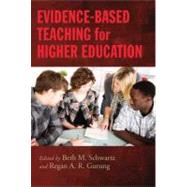
Note: Supplemental materials are not guaranteed with Rental or Used book purchases.
Purchase Benefits
What is included with this book?
| Contributors | p. vii |
| Foreword | p. ix |
| Acknowledgments | p. xiii |
| Introduction | p. 3 |
| Benefits of Using SoTL in Picking and Choosing Pedagogy | p. 7 |
| Building Rapport in the Classroom and Student Outcomes | p. 23 |
| Using Technology to Enhance Teaching and Learning | p. 39 |
| Online Teaching | p. 59 |
| Experiential Learning | p. 77 |
| How Should Students Study? | p. 99 |
| Selection of Textbooks or Readings for Your Course | p. 117 |
| Are You Really Above Average? Documenting Your Teaching Effectiveness | p. 131 |
| Index | p. 151 |
| About the Editors | p. 159 |
| Table of Contents provided by Ingram. All Rights Reserved. |
The New copy of this book will include any supplemental materials advertised. Please check the title of the book to determine if it should include any access cards, study guides, lab manuals, CDs, etc.
The Used, Rental and eBook copies of this book are not guaranteed to include any supplemental materials. Typically, only the book itself is included. This is true even if the title states it includes any access cards, study guides, lab manuals, CDs, etc.